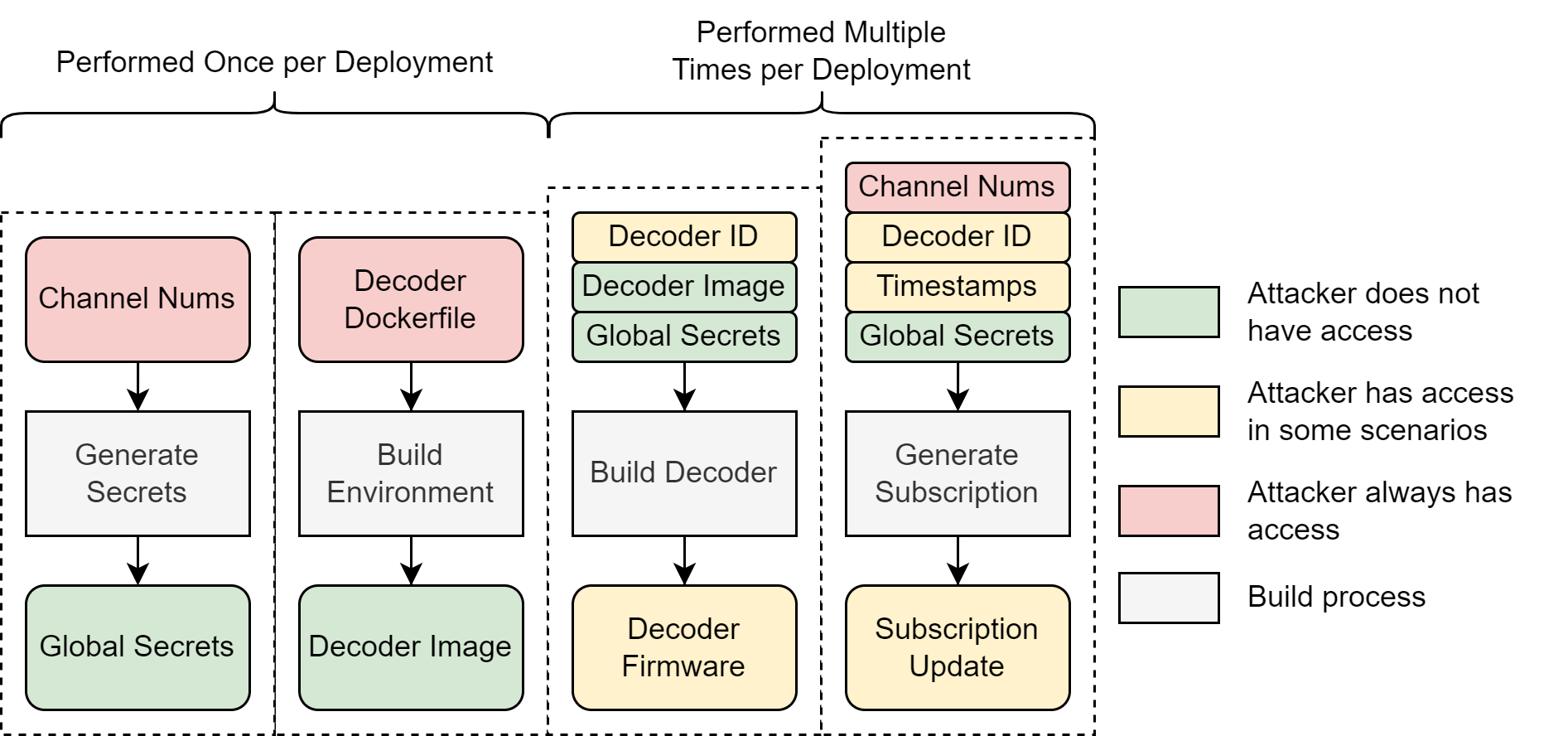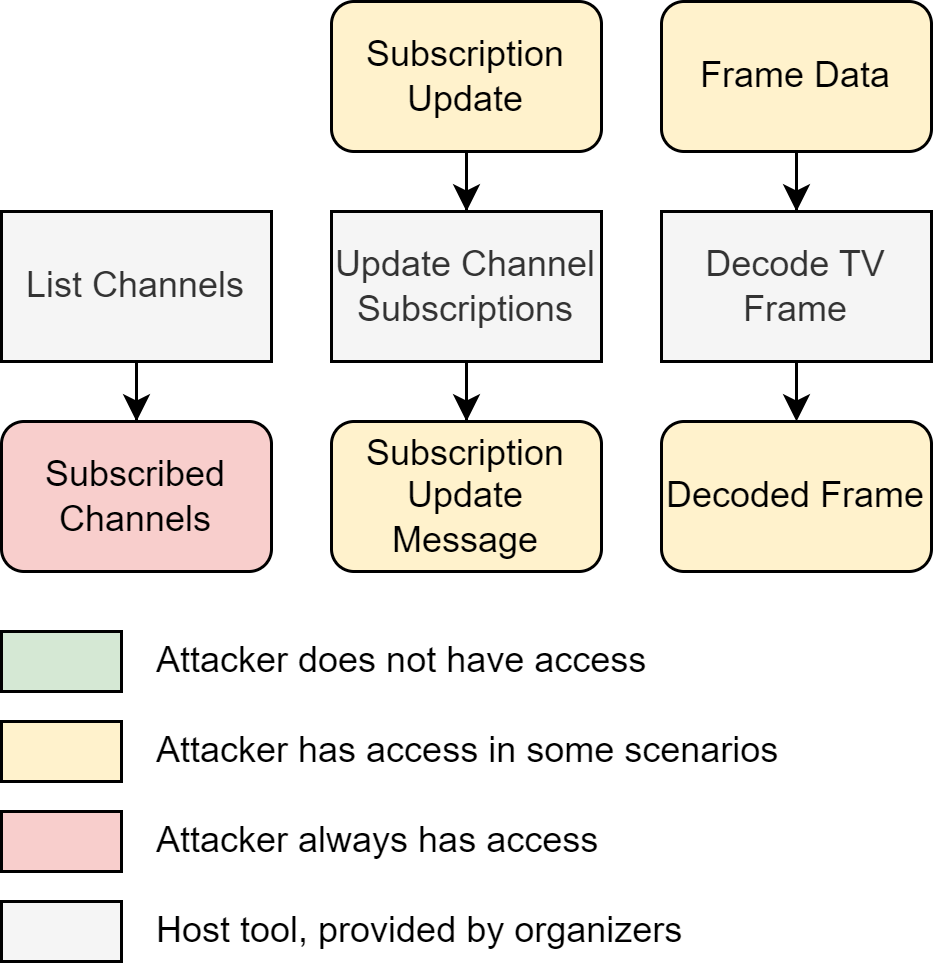Host Tools¶
Warning
ARCHIVED PAST COMPETITION, FOR REFERENCE ONLY
The Host Tools allow teams to have a standard interface to the system functionality described in Functional Requirements. These include tools to build the system as outlined in Build Satellite TV System (see Build Tool Reference Calls below) as well as tools to interact with running decoders as outlined in Decoder Functional Requirements (see Satellite Tool Reference Calls below).
Using the eCTF Tools¶
In order to run the eCTF Tools, you must first ensure that you have installed all of the required packages (ideally into a virtual environment). You can install packages from the included pyproject.toml file in the root of the design directory. This file should not be modified.
# Create a virtual environment in the root of the design
cd <example_root>
python -m venv .venv --prompt ectf-example
# enable virtual environment
. ./.venv/bin/activate
# powershell users will instead need to run:
# . .\.venv\Scripts\Activate.ps1
# Install the host tools
python -m pip install tools/
# Install the host design elements as an editable module
python -m pip install -e design/
Build Tool Reference Calls¶
The build tools are a set of scripts created by the organizers that execute the required build stages as outlined in the Functional Requirements.
The build tools will be utilized by the organizers when testing and provisioning your design. As such, your design must build with these included tools.
These tools cannot be modified by your team and must work as included with the example design.
The build tools are to be executed in a Docker image.

Build Deployment¶
This will generate shared secrets for a given deployment. This step assumes that you have installed the host design elements in your current python environment. As an example, the below command generates secrets to a directory called ‘secrets’. This directory will be referenced in future instructions, but can be changed at the user’s discretion.
mkdir secrets/
python -m ectf25_design.gen_secrets secrets/secrets.json 1 3 4
Build Decoder¶
The Decoder can be built after the secrets have been generated, allowing the build to mount the shared secrets directory as a volume to the build container.
The below example generates a docker image called ‘decoder’ and uses it to run a container where a Decoder build with Device ID 0xdeadbeef. The build outputs of this command are copied to the directory “build_out”.
Example invocation:
cd <design_root>/decoder
docker build -t decoder .
docker run --rm -v ./build_out:/out -v ./:/decoder -v ./../secrets:/secrets -e DECODER_ID=0xdeadbeef decoder
Flashing Tool¶
Flashing the MAX78000 is done through the eCTF Bootloader. You will need to initially flash the bootloader onto the provided hardware.
The eCTF bootloader needs to be in update mode to be flashable. The bootloader is in update mode when the onboard LED is flashing blue. This mode can be entered by holding the bootloader button while resetting the board.
python -m ectf25.utils.flash -h
usage: ectf25.utils.flash [-h] infile port
positional arguments:
infile Path to the input binary
port Serial port
options:
-h, --help show this help message and exit
Example invocation:
python -m ectf25.utils.flash ./build_out/max78000.bin /dev/tty.usbmodem11302
Satellite Tool Reference Calls¶
All host tools are provided by the organizers and create simplistic interfaces for communication between the Host Computer and the Decoder. These tools define the uniform interface utilized to meet the technical requirements on the AP. See Decoder Interface for the details of the protocol of the interface the Host Tools use to communicate with the Decoder.

List Tool¶
The list tool applies the required list channels functionality from the Satellite TV Decoder system.
python -m ectf25.tv.list -h
usage: ectf25.tv.list [-h] port
List the channels with a subscription on the Decoder
positional arguments:
port Serial port to the Decoder
options:
-h, --help show this help message and exit
Example Utilization:
python -m ectf25.tv.list /dev/tty.usbmodem11302
Subscription Update Tool¶
The subscription update tool applies the required subscription update functionality from the Satellite TV Decoder System. The subscription update tool takes in an encoded update packet (in the form of a .bin file) and sends it to the Decoder. Note that subscription update packets can be generated using Secure Facility Docker ENTRYPOINT.
python -m ectf25.tv.subscribe -h
usage: ectf25.tv.subscribe [-h] subscription_file port
Updates a Decoder's subscription.
positional arguments:
subscription_file Path to the subscription file created by ectf25_design.gen_subscription
port Serial port to the Decoder
options:
-h, --help show this help message and exit
Example Utilization:
python -m ectf25.tv.subscribe subscription.bin /dev/tty.usbmodem11302
Running the Satellite and Encoder¶
To run all of the infrastructure, you will need to first start the uplink. Then, in a
separate terminal window, start the satellite. And finally, start a TV instance
for every Decoder being tested.
Uplink¶
The uplink is the component of the Satellite TV system responsible for sending encoded frames to the satellite. It will use the Encoder from your design to encode frames.
python -m ectf25.uplink -h
usage: __main__.py [-h] secrets host port channels [channels ...]
positional arguments:
secrets Path to the secrets file
host TCP hostname to serve on
port TCP port to serve on
channels List of channel:fps:frames_file pairings (e.g., 1:10:channel1_frames.json
2:20:channel2_frames.json)
options:
-h, --help show this help message and exit
Example Utilization:
python -m ectf25.uplink ./decoder/secrets/secrets.json localhost 2000 1:10:frames/x_c1.json
Satellite¶
The satellite is responsible for broadcasting all frames received from the uplink to all listening TVs on the host computer.
python -m ectf25.satellite -h
usage: satellite.py [-h] up_host up_port down_host channels [channels ...]
positional arguments:
up_host Hostname for uplink
up_port Port for uplink
down_host Hostname for downlink
channels List of channel:down_port pairings (e.g., 1:2001 2:2002)
options:
-h, --help show this help message and exit
Example Utilization:
python -m ectf25.satellite localhost 2000 localhost 1:2001
TV¶
The TV is responsible for sending encoded frames received from the satellite to a decoder connected to the host computer and returning the decoded result.
python -m ectf25.tv.run -h
usage: ectf25.tv.run [-h] [--baud BAUD] sat_host sat_port dec_port
positional arguments:
sat_host TCP host of the satellite
sat_port TCP port of the satellite
dec_port Serial port to the Decoder
options:
-h, --help show this help message and exit
--baud BAUD Baud rate of the serial port
Example Utilization:
python -m ectf25.tv.run localhost 2001 /dev/tty.usbmodem11302